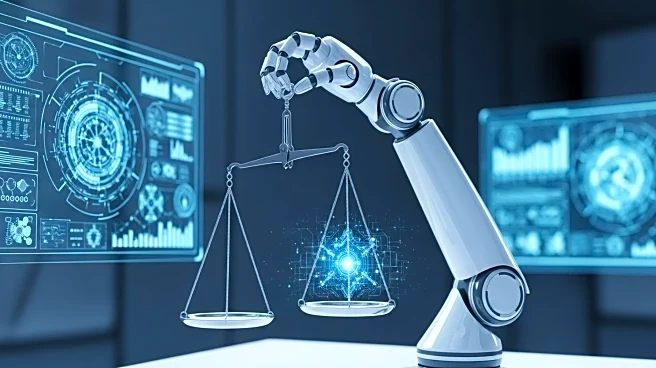What is the story about?
What's Happening?
Geoffrey Hinton, a Nobel laureate and renowned computer scientist often referred to as the 'godfather of AI,' has expressed concerns about the impact of artificial intelligence on employment and economic inequality. In an interview with the Financial Times, Hinton predicted that AI would lead to significant unemployment as companies replace human workers with AI technologies. He attributes this potential shift not to the technology itself but to the capitalist system that prioritizes profit over employment. Hinton noted that while layoffs have not yet surged, there is growing evidence that AI is reducing entry-level job opportunities, particularly affecting recent college graduates. He also highlighted that industries like healthcare might benefit from AI, as it could increase efficiency without necessarily reducing jobs.
Why It's Important?
The implications of Hinton's predictions are significant for the U.S. economy and workforce. If AI leads to widespread unemployment, it could exacerbate economic inequality, with wealth concentrating among those who own and control AI technologies. This shift could challenge existing economic structures and necessitate new policies to address job displacement and income inequality. Hinton's comments also raise questions about the role of government and industry in managing AI's impact, including the potential need for regulations to ensure that AI development benefits society broadly rather than a select few. The discussion around AI's impact on jobs also touches on broader societal issues, such as the value of work and human dignity, which Hinton argues cannot be addressed by solutions like universal basic income alone.
What's Next?
As AI continues to evolve, stakeholders including policymakers, businesses, and civil society groups will need to consider strategies to mitigate potential negative impacts on employment. This could involve investing in retraining programs to help workers transition to new roles, as well as exploring regulatory frameworks to manage AI's integration into the workforce. The debate over AI's role in the economy is likely to intensify, with potential policy responses including discussions on taxation, labor rights, and social safety nets. Additionally, the ethical and societal implications of AI will remain a critical area of focus as the technology advances.
Beyond the Headlines
Hinton's warnings also highlight the ethical considerations surrounding AI development. The potential for AI to be used maliciously, such as in creating bioweapons, underscores the need for international cooperation and regulation to prevent misuse. Furthermore, the rapid pace of AI advancement poses challenges in predicting its long-term effects on society, making it crucial for stakeholders to remain vigilant and proactive in addressing both the opportunities and risks associated with AI.
















